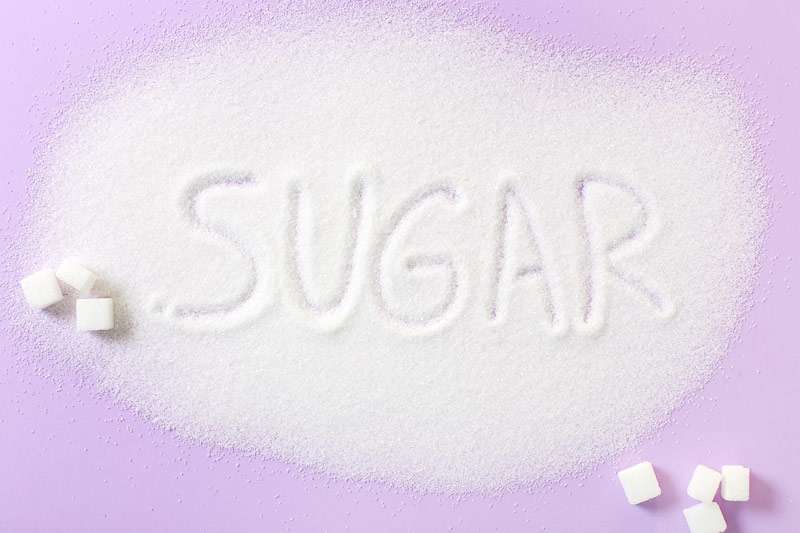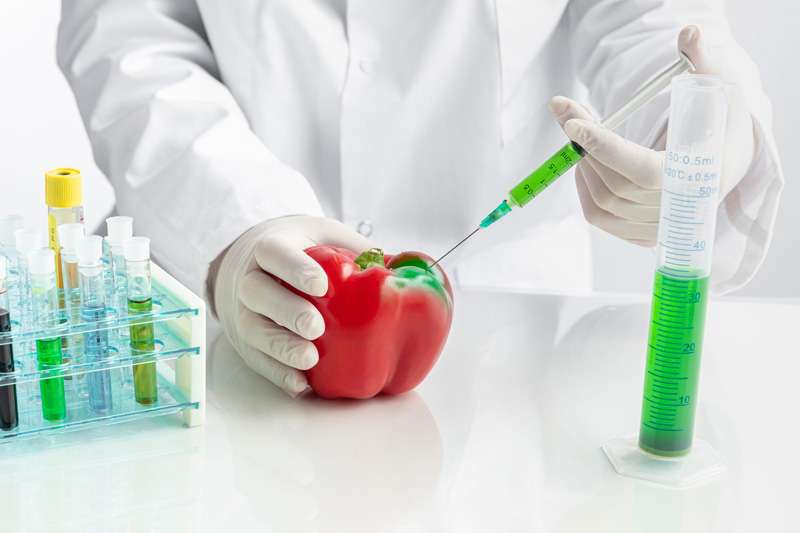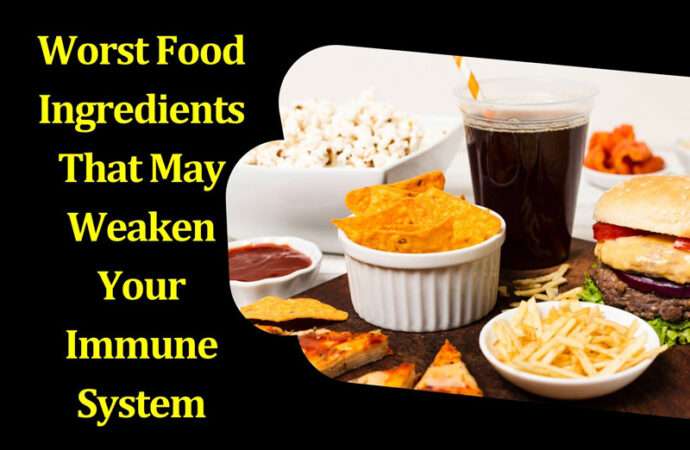Your immune system is your body’s natural defense against a wide range of pathogens, from bacteria and viruses to fungi and parasites. Keeping your immune system strong is essential for maintaining good health and preventing illnesses. While various factors, including genetics, lifestyle, and overall health, influence the strength of your immune system, your diet plays
Your immune system is your body’s natural defense against a wide range of pathogens, from bacteria and viruses to fungi and parasites. Keeping your immune system strong is essential for maintaining good health and preventing illnesses. While various factors, including genetics, lifestyle, and overall health, influence the strength of your immune system, your diet plays a significant role. Consuming a well-balanced and nutritious diet can help bolster your immune defenses. However, there are several food ingredients that, when consumed in excess or too frequently, may have a detrimental impact on your immune system. In this article, we will explore some of the worst food ingredients that may weaken your immune system.
1. Excessive Sugar
Sugar is a common ingredient in many processed and convenience foods, including sugary drinks, sweets, and desserts. While sugar itself is not inherently harmful, consuming it in excess can have negative effects on your immune system. Excessive sugar intake can cause increased inflammation and a weakened immune response.

When you consume high levels of sugar, your body’s white blood cells become less effective at fighting off bacteria and viruses. This weakening of the immune response can last for several hours after consuming sugary foods or beverages. Additionally, high sugar intake can lead to obesity, also can cause chronic inflammation and a compromised immune system.
To support your immune system, it’s essential to limit your sugar intake and opt for natural sweeteners like honey or maple syrup when necessary. Focus on consuming whole fruits for a healthier source of sweetness, as they also provide essential vitamins and antioxidants.
2. Trans Fats
Trans fats are artificially created fats that are often found in partially hydrogenated oils used in processed and fried foods. These fats can cause a range of health problems, including heart disease and a weakened immune system. Trans fats can increase inflammation in the body, impair the function of immune cells, and decrease the body’s ability to fight off infections.

Avoiding trans fats means steering clear of many fast food items, packaged snacks, and certain margarines. Instead, opt for foods rich in healthy fats, such as avocados, nuts, and olive oil, which can support your immune system and overall health.
3. High-Sodium Foods
A diet high in sodium, commonly found in processed and fast foods, can also negatively impact your immune system. Excessive sodium intake can lead to high blood pressure and disrupt the balance of electrolytes in your body. This can stress your immune system and make it less effective at combating infections.

To reduce your sodium intake, focus on preparing fresh and homemade meals with minimal salt. Use herbs and spices to add flavor to your dishes instead of relying on excessive salt. Additionally, be mindful of the sodium content in canned and processed foods, as they often contain hidden sources of salt.
4. Alcohol
Alcohol consumption, especially in excess, can have a detrimental effect on your immune system. It can impair the function of immune cells, disrupt the balance of gut bacteria, and increase inflammation in the body. These effects make the body more susceptible to infections and can hinder the body’s ability to recover from illnesses.

Moderate alcohol consumption may not pose a significant threat to your immune system, but heavy and chronic drinking can weaken your defenses. To support your immune system, it’s advisable to limit alcohol intake and prioritize healthier beverage choices like water, herbal tea, and fresh fruit juices.
5. Highly Processed Foods
Highly processed foods are often loaded with unhealthy food additives, preservatives, and artificial ingredients. These additives can disrupt the balance of beneficial bacteria in your gut, which plays a crucial role in your immune system’s functioning. A healthy gut microbiome helps protect against infections and supports overall immune health.

Moreover, processed foods are typically low in essential nutrients and high in empty calories, contributing to nutritional deficiencies that can weaken your immune system. It’s essential to focus on a diet rich in whole, unprocessed foods to maintain a robust immune response.
6. Artificial Sweeteners
Artificial sweeteners, such as aspartame and saccharin, are often used as sugar substitutes in diet beverages and sugar-free products. While they are marketed as a healthier alternative to sugar, there is some evidence suggesting that artificial sweeteners may negatively affect the immune system.

Research on artificial sweeteners and their impact on the gut microbiome is ongoing, but some studies indicate that they may disrupt the balance of gut bacteria, which, as previously mentioned, can influence immune health. If you need to sweeten your foods or beverages, consider natural alternatives like stevia or erythritol, which are less likely to affect the gut microbiome.
7. Preservatives and Additives
Many processed foods contain a wide range of artificial preservatives, flavor enhancers, and colorants. These additives are used to extend the shelf life of products and enhance their taste or appearance. However, some of these chemicals may have a negative impact on the immune system.
For example, some food colorants have been linked to hyperactivity in children and potential immune system disturbances. Additionally, certain preservatives and flavor enhancers, such as monosodium glutamate (MSG), have been associated with inflammation and adverse immune reactions in some individuals.
To support your immune system, it’s advisable to limit your consumption of highly processed foods and focus on whole, natural options. When choosing packaged foods, read labels carefully and opt for products with minimal additives.
8. Caffeine
Caffeine is a key ingredient in many popular beverages and products, including coffee, tea, energy drinks, and certain medications. While moderate caffeine consumption can offer some benefits, excessive intake can have a negative impact on your immune system. Caffeine can disrupt sleep patterns, increase stress hormone production, and lead to chronic stress, which weakens the immune response.

To promote a healthy immune system, it’s essential to consume caffeine in moderation. Avoid excessive caffeine intake, especially in the hours leading up to bedtime. Prioritize good sleep hygiene to ensure that your body has the rest it needs to maintain a strong immune defense.
9. Excessive Red and Processed Meat
Red meat, especially when processed (e.g., bacon, sausages, and hot dogs), can have a detrimental effect on your immune system when consumed excessively. High consumption of red and processed meats can weaken immune function.

Additionally, red and processed meats can contain harmful compounds such as heme iron and heterocyclic amines. Surely they have adverse effects on the gut microbiome and contribute to inflammation. To support your immune system, consider reducing your intake of red and processed meats. Also, go for leaner protein sources like poultry, fish, and plant-based options.
10. Excessive Alcohol
Alcohol consumption, especially in excess, can have a detrimental effect on your immune system. It can impair the function of immune cells, disrupt the balance of gut bacteria, and increase inflammation in the body. These effects make the body more susceptible to infections and can hinder the body’s ability to recover from illnesses.
Moderate alcohol consumption may not pose a significant threat to your immune system. But heavy and chronic drinking can weaken your defenses. To support your immune system, it’s advisable to limit alcohol intake. Also, prioritize healthier beverage choices like water, herbal tea, and fresh fruit juices.
11. Artificial Flavorings
Artificial flavorings, commonly found in processed foods, can have a negative impact on your immune system. These chemicals are used to mimic the taste of natural ingredients, but they can be derived from various sources, including coal tar and petroleum.

Some artificial flavorings have been associated with adverse reactions in individuals, potentially triggering immune responses and sensitivities. To maintain a robust immune system, it’s advisable to reduce your consumption of highly processed foods. And opt for products with natural flavorings or no added flavors.
12. High-Glycemic Carbohydrates
High-glycemic carbohydrates can lead to rapid spikes in blood sugar levels. Foods made from refined grains, such as white bread, sugary cereals, and pastries, often fall into this category. These foods can cause fluctuations in blood sugar and insulin levels. Thus can contribute to inflammation and weaken the immune system.
Choosing low-glycemic carbohydrates, like whole grains and legumes, can help stabilize blood sugar levels and support immune health. These foods also provide essential nutrients and dietary fiber that benefit the immune system.
Conclusion
Your immune system is a vital defense mechanism that requires proper nourishment and care. While certain foods and food ingredients can have a detrimental impact on your immune system, maintaining a balanced and nutritious diet can help ensure its optimal functioning. It’s important to be mindful of your food choices. And of course prioritize whole, unprocessed foods rich in essential nutrients, fiber, and antioxidants. By avoiding excessive sugar, trans fats, sodium, alcohol, processed foods, artificial sweeteners, preservatives, caffeine, red and processed meats, artificial flavorings, and high-glycemic carbohydrates, you can help keep your immune system strong and resilient, better protecting your health in the long run. Remember that a balanced diet, coupled with a healthy lifestyle, is key to bolstering your immune defenses and maintaining overall well-being.




























Leave a Comment
Your email address will not be published. Required fields are marked with *